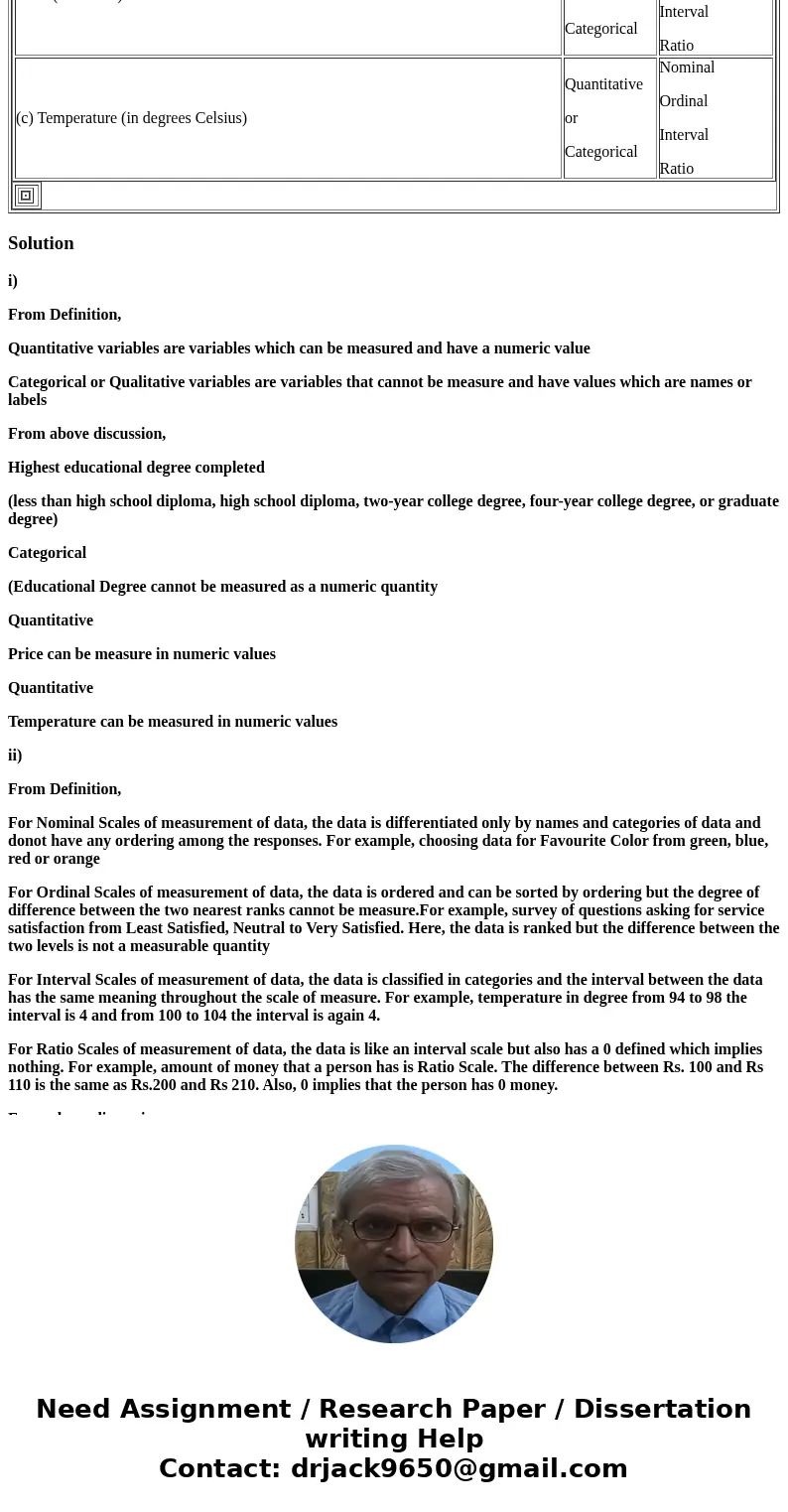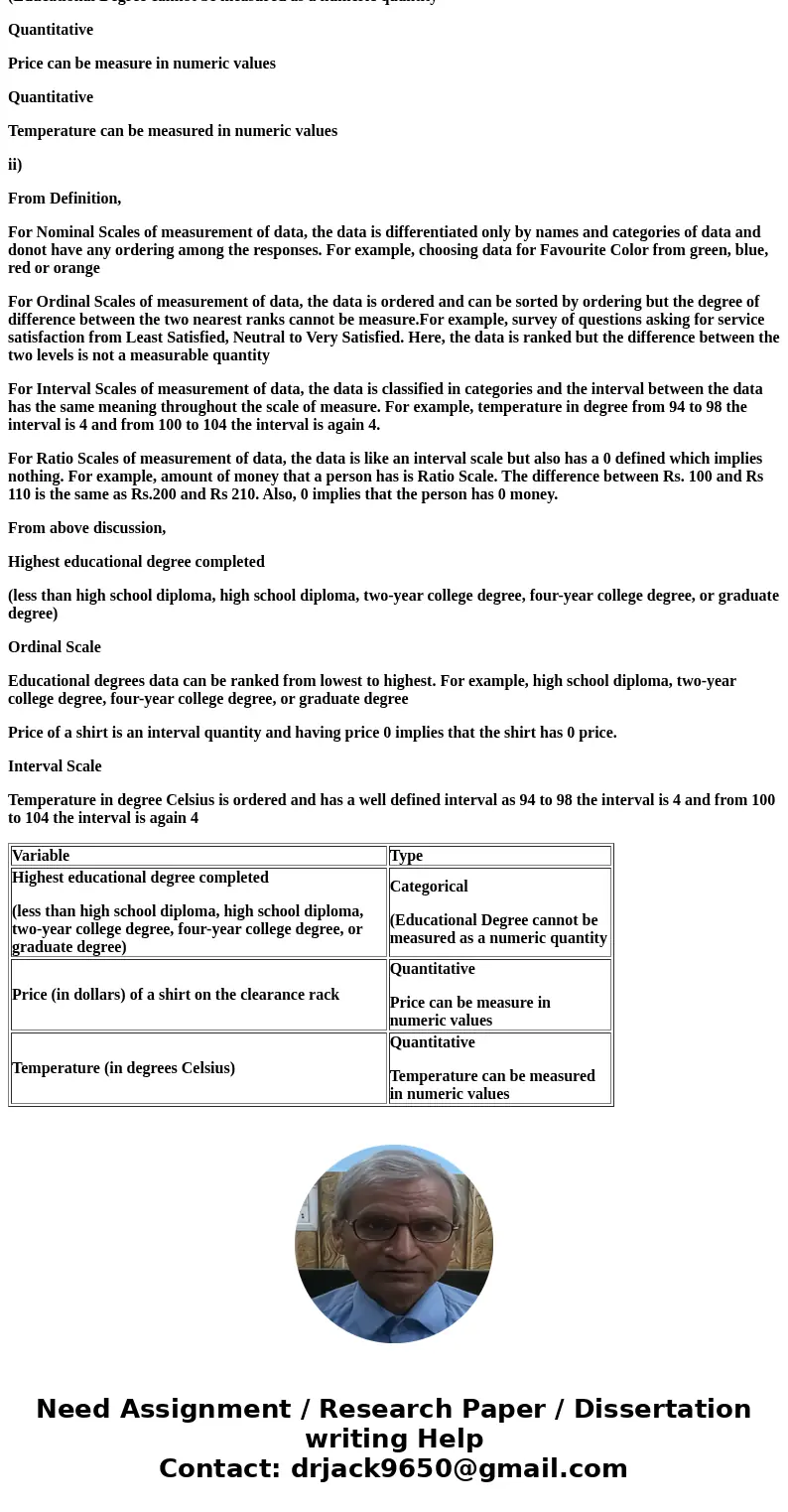For each of the variables described below indicate whether i
For each of the variables described below, indicate whether it is a quantitative or a categorical (qualitative) variable. Also, indicate the level of measurement for the variable: nominal, ordinal, interval, or ratio. Make sure your responses are the most specific possible.
Quantitative
or
Categorical
Nominal
Ordinal
Interval
Ratio
Quantitative
or
Categorical
Nominal
Ordinal
Interval
Ratio
Quantitative
or
Categorical
Nominal
Ordinal
Interval
Ratio
| For each of the variables described below, indicate whether it is a quantitative or a categorical (qualitative) variable. Also, indicate the level of measurement for the variable: nominal, ordinal, interval, or ratio. Make sure your responses are the most specific possible.
|
Solution
i)
From Definition,
Quantitative variables are variables which can be measured and have a numeric value
Categorical or Qualitative variables are variables that cannot be measure and have values which are names or labels
From above discussion,
Highest educational degree completed
(less than high school diploma, high school diploma, two-year college degree, four-year college degree, or graduate degree)
Categorical
(Educational Degree cannot be measured as a numeric quantity
Quantitative
Price can be measure in numeric values
Quantitative
Temperature can be measured in numeric values
ii)
From Definition,
For Nominal Scales of measurement of data, the data is differentiated only by names and categories of data and donot have any ordering among the responses. For example, choosing data for Favourite Color from green, blue, red or orange
For Ordinal Scales of measurement of data, the data is ordered and can be sorted by ordering but the degree of difference between the two nearest ranks cannot be measure.For example, survey of questions asking for service satisfaction from Least Satisfied, Neutral to Very Satisfied. Here, the data is ranked but the difference between the two levels is not a measurable quantity
For Interval Scales of measurement of data, the data is classified in categories and the interval between the data has the same meaning throughout the scale of measure. For example, temperature in degree from 94 to 98 the interval is 4 and from 100 to 104 the interval is again 4.
For Ratio Scales of measurement of data, the data is like an interval scale but also has a 0 defined which implies nothing. For example, amount of money that a person has is Ratio Scale. The difference between Rs. 100 and Rs 110 is the same as Rs.200 and Rs 210. Also, 0 implies that the person has 0 money.
From above discussion,
Highest educational degree completed
(less than high school diploma, high school diploma, two-year college degree, four-year college degree, or graduate degree)
Ordinal Scale
Educational degrees data can be ranked from lowest to highest. For example, high school diploma, two-year college degree, four-year college degree, or graduate degree
Price of a shirt is an interval quantity and having price 0 implies that the shirt has 0 price.
Interval Scale
Temperature in degree Celsius is ordered and has a well defined interval as 94 to 98 the interval is 4 and from 100 to 104 the interval is again 4
| Variable | Type |
| Highest educational degree completed (less than high school diploma, high school diploma, two-year college degree, four-year college degree, or graduate degree) | Categorical (Educational Degree cannot be measured as a numeric quantity |
| Price (in dollars) of a shirt on the clearance rack | Quantitative Price can be measure in numeric values |
| Temperature (in degrees Celsius) | Quantitative Temperature can be measured in numeric values |



 Homework Sourse
Homework Sourse